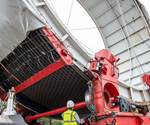Airborne Oil & Gas, SÍMEROS qualify deepwater TCP Risers in Brazil
The thermoplastic composite pipe riser for deepsea oil and gas applications will be the first qualified in Brazil.
Oilfield technology firm Airborne Oil & Gas (IJmuiden, Netherlands) and engineering company SÍMEROS Technologies have signed a collaboration agreement which aims to deliver the first qualified thermoplastic composite pipe (TCP) risers for deepsea oil and gas use in Brazil.
In 2018, Airborne Oil & Gas began the qualification program for its TCP Riser, which the company says is a world first for fully bonded, free hanging composite risers for deepwater applications. The program is said to be receiving funding from a major operator in the region and is aimed at qualifying the TCP Riser for deepwater applications including those in pre-salt and highly corrosive conditions.
Airborne Oil & Gas’ TCP Riser design aims to deliver the lowest cost solution for total installation of dynamic risers in deepwater applications, while offering maximum flexibility to operators in terms of subsea configuration and choice of installation vessel.
The TCP Flowlines and Risers developed by Airborne Oil & Gas can be installed by existing flex-lay and reel-lay vessels and can be installed in the flexible and cost effective free hanging catenary mode.
“Following our announcement in June last year regarding our TCP Riser qualification program, we are very pleased with the opportunity to add SÍMEROS to our partnering approach in Brazil to support on local qualification, development and manufacturing of the TCP end fittings, says Renato Bastos, Airborne Oil & Gas Brazil vice president. “With tremendous support from our clients, we have developed the TCP Riser with optimal characteristics for cost, weight and bend radius, while using robust materials with many years of proven track record in the field.”
“We are delighted to be working with Airborne Oil & Gas on this exciting qualification program which may change the face of the subsea industry in years to come,” says Fabiano Bertoni, SÍMEROS director. “Brazil is a very attractive deepwater market and will likely play a dominant role in the global deepwater environment moving forward. The qualification program for Airborne Oil & Gas’ TCP Riser includes rigorous testing with full monitoring by DNV GL and a clear staircase, leading to qualified TCP Risers for hydrocarbon and water & gas service, in deepwater and dynamic applications.”
“Installed in free hanging catenary configuration, our TCP Riser provides the opportunity for significant savings on typical FPSO development, through faster installation and avoiding the need to use buoyancy modules,” adds Oliver Kassam, Airborne Oil & Gas CEO. “With our track record to date delivering various applications for major operators around the globe, including hydrocarbon service, we are moving forward rapidly on this program to qualify the TCP Riser. SÍMEROS has extensive experience in flexible pipe qualification testing and we look forward to a successful working partnership.”
Related Content
-
Thermoplastic composites: Cracking the horizontal body panel nut
Versatile sandwich panel technology solves decades-long exterior automotive challenge.
-
Assembling the Multifunctional Fuselage Demonstrator: The final welds
Building the all-thermoplastic composite fuselage demonstrator comes to an end with continuous ultrasonic welding of the RH longitudinal fuselage joint and resistance welding for coupling of the fuselage frames across the upper and lower halves.
-
The potential for thermoplastic composite nacelles
Collins Aerospace draws on global team, decades of experience to demonstrate large, curved AFP and welded structures for the next generation of aircraft.
.jpg;width=70;height=70;mode=crop)





